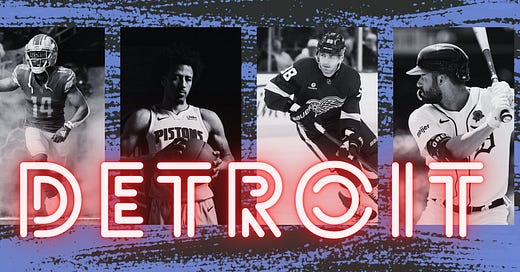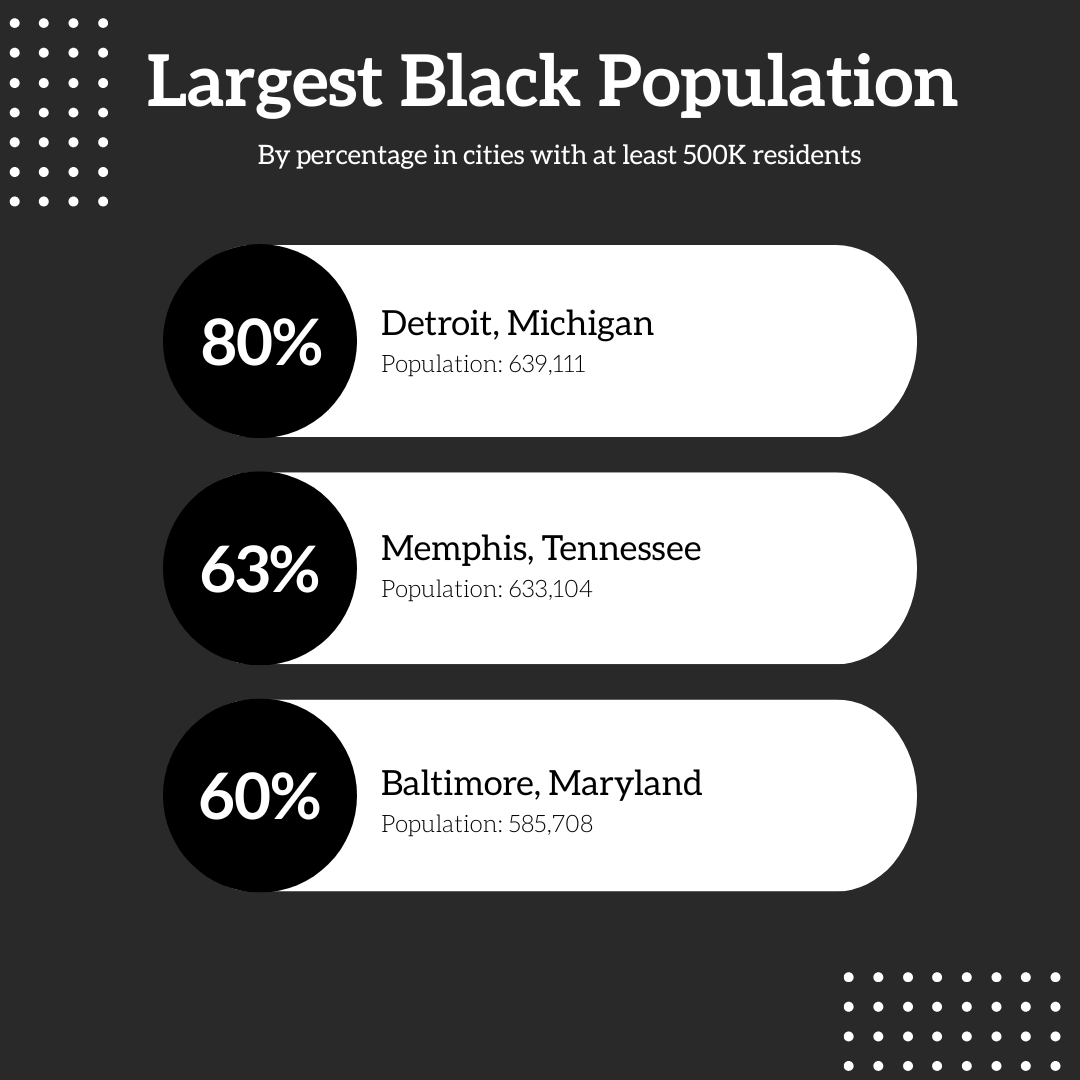A Defense of Detroit: A Great American Sports City
Sophie Cunningham’s comments diminish one of the great city revivals of the modern era while displaying an ugliness about the way we view American cities
The WNBA is expanding once again as it continues to take advantage of its explosion in fan interest with players like Caitlin Clark, Angel Reese, and Paige Bueckers entering the league. Golden State tipped off their inaugural season this year, with Toronto coming next year. Recently, it was announced that by 2030, the league is adding another three teams in Philadelphia, Cleveland, and Detroit.
It’s an exciting moment for the people of those cities, who have another team to root for. The return of women’s basketball in Detroit is especially significant after the Shock left in 2009 after winning two WNBA championships. The people of Detroit are excited with billboards triumphantly proclaiming the return of professional women’s basketball to the Motor City.
Not everyone, however, shares the enthusiasm of Detroiters. Sophie Cunningham, a reserve guard for the Indiana Fever, was asked about the new teams and gave an answer that rubbed many the wrong way. Cunningham felt that cities like Nashville, Kansas City, and Miami would have been better choices and then went on to say, “I don’t know how excited people are to be going to Detroit or Cleveland”. Cunningham’s comments are the latest example of people taking shots at the city of Detroit, a city that has continued to rise from the ashes and is one of the best sports towns that we have in America.
A City That Loves Its Teams
I lived in Detroit from 2005-2023. During that time, the cities’ basketball, football, and baseball teams struggled through lean years, failing to register a winning percentage of 50%. From 2017-2023 they combined for one playoff appearance and zero playoff wins. It was a time where fans could have easily bailed on their teams and found something better to do with their time.
But that is not how Detroit fans are built. In my time in the city, fans were passionate about their teams and watched them religiously. Unlike a city like Miami (which Cunningham mentioned as a better alternative), Detroit fans have shown themselves to be incredibly loyal to their teams as opposed to only staying around during the good times. But when the Miami Marlins became a playoff team again, there was hope that attendance would improve, but it did not.
By contrast, Detroit fans have often stood strong even in the worst of times. The Detroit Lions, who before the Dan Campbell era were the laughingstock of the NFL, have often drawn a good crowd. Tailgating outside the stadium on Sundays was impressive, even if the product on the field wasn’t.
Pistons fans have long been some of the most passionate fans in the NBA, as was evidenced by the environment that they produced when the team played the New York Knicks in the first round of the playoffs this past season.
When the city is at its best is when its teams reflect a workman-like persona that fans can truly embrace. We have seen this with both the Lions and Pistons recently as both teams have embraced toughness, grit, and resilience.
Throughout the city, streets were filled with fans, bonding over teams that became the great unifier for them. Even less popular sports see a boost in Detroit. Detroit City FC, a soccer club that plays in the USL Championship, has often set the standard for stadium atmosphere in that league and offers an experience that surpasses that of many MLS teams. Filled with unique chants and smoke bombs, attending a match at Keyworth Stadium is an experience that feels lifted from a European soccer fixture.
Players that do well in Detroit are often immortalized and remembered forever. When Matthew Stafford made his return to Detroit after being traded to the LA Rams, he was cheered as a golden child making his triumphant return. As a further display of dedication, during his first season in Los Angeles, many Lions fans started rooting for the Rams as a show of support.
There is a cultural attachment to these teams that isn’t present in many cities. Attending games is a rite of passage and fans are a part of a tradition. Elements of Detroit city culture are embedded into its professional teams, fostering a sense of community that so many other franchises and cities shy away from. The going to work motifs, the presence of “Buffs” (Cartier buffalo frame sunglasses) at games worn by players and fans alike, and the injection of local lexicon at the arenas are all things that make winning and rooting in Detroit special.
There is a sort of “us versus them” mentality that comes with playing in Detroit that is frequently adopted by both the players and fans. Because Detroit is often derided as a city, all the entities involved in its athletic pursuits take that personally—evoking the fabled “Detroit versus everybody” ethos. This is a city of underdogs that are unafraid to expose their teeth, equipped with a toughness that other cities cannot match.
Cunningham’s comments are not new to Detroiters. Throughout the last few decades, the city has been the target of slander—called a wasteland and a hellhole that is riddled with crime. In short, many have viewed the city as a place that no one would want to visit. The reality is that the city has experienced profound revitalization through various infrastructure and beautification projects.
Detroit features various attractions for tourists and residents, contrary to Cunningham’s claims. The Detroit Institute of Arts was ranked as a top art museum in the country, and the city features a vibrant independent art scene. The beer industry has also thrived in Detroit with multiple breweries originating in the city such as Founders, Atwater, and others. The music scene in the city is also vibrant, serving as a hub for electronic music as well as a burgeoning melting pot for local rappers.
Cunningham’s assertion that there is nothing to do in Detroit is a fable that is laced with racist talking points that have been placed upon predominantly Black cities as a way of devaluing them, suggesting that they are somehow less than when compared to whiter cities. It’s a tactic that goes back decades and is an example of the same old playbook but with different wording.
Veiled Messaging
Recently, ESPN analyst Stephen A. Smith made an assertion about the city of Memphis, stating that NBA players didn’t want to play there because the city is unsafe. The comment received some blowback and Smith backtracked slightly by calling Memphis a “great sports city” but still stood by his assessment. The comments even led into social feuds with Smith and Grizzlies star Ja Morant and even a statement by the mayor of Memphis.
You may be wondering what these comments about Memphis have to do with Detroit. Of cities with a population of over 500,000 people, Detroit and Memphis rank first and second in Black population percentage. 80% of Detroit’s 639,000 population is Black, while 63% of Memphis’ 633,000-person population is Black. The third ranked city by this metric is Baltimore, which features a 60% Black population of its 585,000 people. The common thread of those cities is that they are often labeled as undesirable and unsafe, and they are also predominantly Black cities.
Let’s examine the reputations of the cities that Cunningham mentioned as preferable destinations. Miami is likely the most transparent selection. A city long known for its party scene and beaches would naturally appeal to a 28-year-old conventionally attractive white woman. The other two, however, feel a little more pointed from a racial demographic's perspective.
Cunningham grew up in Columbia, Missouri and attended the University of Missouri. Columbia is 74% white and is only two hours from Kansas City, one of Cunningham’s preferred expansion destinations that is 54% white. Her other destination is Nashville, which is 72% white and has famously become a hot spot for white brides to host their bachelorette parties and girls weekends. Nashville has also become a hub for white influencers to move to as a way of continuing to profit from filming their children for family-based content on TikTok and Instagram.
Cunningham mentioning that Nashville and Kansas City are better “lifestyle” destinations for WNBA players simply reeks of delusions of white exceptionalism. Cunningham has come to be a sort of white champion in a country that has become increasingly hostile to non-white people.
With many fans gravitating towards Caitlin Clark over the last two years and often deriding Black players as thugs, Cunningham has entered the fray as Clark’s enforcer, which has endeared her to many white fans that have felt emboldened by the second term of US president Donald Trump.
The result of these dynamics is that Detroit’s place as a great sports city has been attacked. Between culture, food, party scene, and art, Detroit offers just as much as any other city, with a great culture of supporting its teams and athletes. The WNBA likely chose the city because it is a reemerging market with a history of women’s basketball and a stellar track record of supporting its NBA franchise.
Cunningham’s comments highlight the lack of respect predominantly Black cities receive in this version of America. It’s from the same playbook that has made cities like Chicago and Baltimore seem like warzones. The reality is that Detroit is a vibrant city that is coming back and any athlete who plays there and plays hard would be embraced with open arms. Detroit is a great American sports city, and it deserves to be treated as such.







